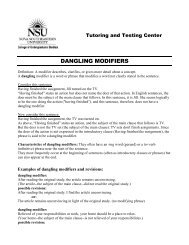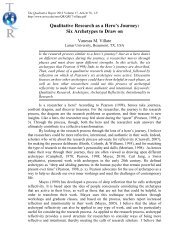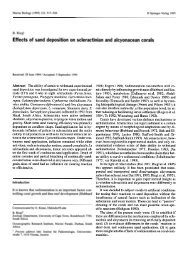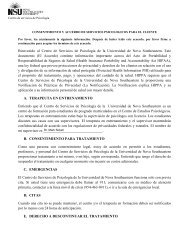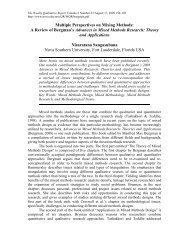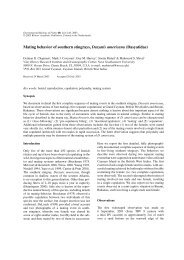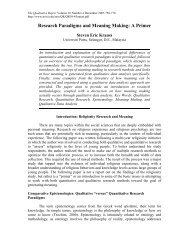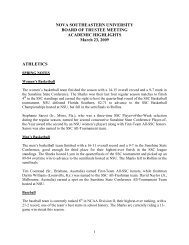Contextualizing Theories and Practices of Bricolage Research
Contextualizing Theories and Practices of Bricolage Research
Contextualizing Theories and Practices of Bricolage Research
You also want an ePaper? Increase the reach of your titles
YUMPU automatically turns print PDFs into web optimized ePapers that Google loves.
14 The Qualitative Report 2012<br />
contribute to the practice . . . she did urge people to recognize the concerns<br />
<strong>and</strong> keep attempting to change the focus <strong>of</strong> the pageant from the<br />
superficial celebration <strong>of</strong> beauty to a meaningful recognition <strong>of</strong> individual<br />
worth. (p. 198)<br />
For McLean, the councilor’s speech was significant, as it signified a shift in discourses<br />
surrounding the pageant. She explains that “her speech represented a negotiation that<br />
might not have happened without the critical discursive examination initiated by the<br />
WMC critical literacies’ community” (p. 198).<br />
Conclusion<br />
This article intended to concisely, yet thoroughly, introduce the concept <strong>of</strong><br />
bricolage in relation to qualitative research. More generally, however it showed how<br />
scholars <strong>and</strong> researchers who adopt bricolage do so with a recognition that the approach<br />
pushes the borders <strong>of</strong> traditional multi-methods qualitative research. <strong>Bricolage</strong> addresses<br />
the plurality <strong>and</strong> complex political dimensions <strong>of</strong> knowledge work. While I hope my text<br />
provides a thick description <strong>of</strong> bricolage, I also hope that it generates critical dialogue --<br />
dialogue that entices others to continue to push <strong>and</strong> disrupt other constraining, <strong>and</strong><br />
potentially oppressive, borders in qualitative research.<br />
References<br />
Althusser, L. (2006). Ideology <strong>and</strong> ideological state apparatuses. In A. Sharma & A.<br />
Gupta (Eds.), The anthropology <strong>of</strong> the state: A reader (pp. 86-111). Malden, MA:<br />
Blackwell.<br />
Becker, H. S. (1998). Tricks <strong>of</strong> the trade. Chicago, IL: University <strong>of</strong> Chicago Press.<br />
Berry, K. S. (2004a) Structures <strong>of</strong> bricolage <strong>and</strong> complexity. In J. L. Kincheloe & Berry,<br />
K. S. (Eds.), Rigour <strong>and</strong> complexity in educational research: Conceptualizing the<br />
bricolage (pp. 103-127). Maidenhead: Open University Press.<br />
Berry, K. S. (2004b) Feedback looping for increasing complexity. In J. L. Kincheloe &<br />
Berry, K. S. (Eds.), Rigour <strong>and</strong> complexity in educational research:<br />
Conceptualizing the bricolage (pp. 128-146). Maidenhead: Open University<br />
Press.<br />
Berry, K. S. (2006). <strong>Research</strong> as bricolage: Embracing relationality, multiplicity <strong>and</strong><br />
complexity. In K. Tobin & J. L. Kincheloe (Eds.), Doing educational research: A<br />
h<strong>and</strong>book (pp. 87-116). Rotterdam: The Netherl<strong>and</strong>s: Sense Publishers.<br />
Berry, K. S. (2011). Embracing radical research: A commentary on ‘To the next level:<br />
Continuing the conceptualization <strong>of</strong> the bricolage’. In J. L. Kincheloe, k. hayes, S.<br />
Steinberg, & K. Tobin (Eds.), Key works in critical pedagogy (pp. 279-284).<br />
Rotterdam, The Netherl<strong>and</strong>s: Sense Publishers.<br />
Butler, J. (1990). Gender trouble: Feminism <strong>and</strong> the subversion <strong>of</strong> identity. New York,<br />
NY: Routledge.<br />
de Saussure, F. (1974). Course in general linguistics. London: Peter Owen.<br />
Denzin, N. K., & Lincoln, Y. S. (Eds.). (1999). The SAGE h<strong>and</strong>book <strong>of</strong> qualitative<br />
research (3rd ed.). Thous<strong>and</strong> Oaks, CA: Sage Publications.



